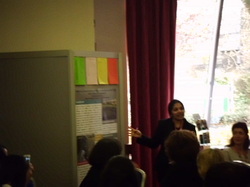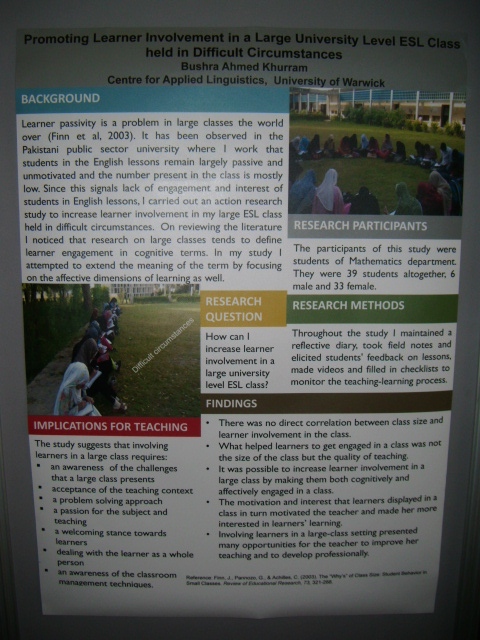
Bushra Ahmed Khurram
Research on large classes tends to define learner engagement in cognitive terms. This poster reports on an action research study that attempts to extend the meaning of the term by focusing on affective dimensions. The study was carried out to increase learner involvement in a large ESL class held in difficult circumstances in a public sector university in Pakistan. Throughout the study the teacher-researcher maintained a reflective diary, took field notes and elicited students' feedback on lessons, made videos and filled in checklists to monitor the teaching-learning process. The findings of the study show that involving students both affectively as well as cognitively in a class can lead to learner engagement in a large class. This poster discusses the results of the study and its implications for teacher educators and other classroom teachers working in similar circumstances.
Video of 3-minute talk and photo of poster below: Back to Teachers Research! home
Research on large classes tends to define learner engagement in cognitive terms. This poster reports on an action research study that attempts to extend the meaning of the term by focusing on affective dimensions. The study was carried out to increase learner involvement in a large ESL class held in difficult circumstances in a public sector university in Pakistan. Throughout the study the teacher-researcher maintained a reflective diary, took field notes and elicited students' feedback on lessons, made videos and filled in checklists to monitor the teaching-learning process. The findings of the study show that involving students both affectively as well as cognitively in a class can lead to learner engagement in a large class. This poster discusses the results of the study and its implications for teacher educators and other classroom teachers working in similar circumstances.
Video of 3-minute talk and photo of poster below: Back to Teachers Research! home
